人教版高中英语必修5课文原文
Unit 5 课文文本和翻译-高中英语人教版(2019)选择性必修第一册
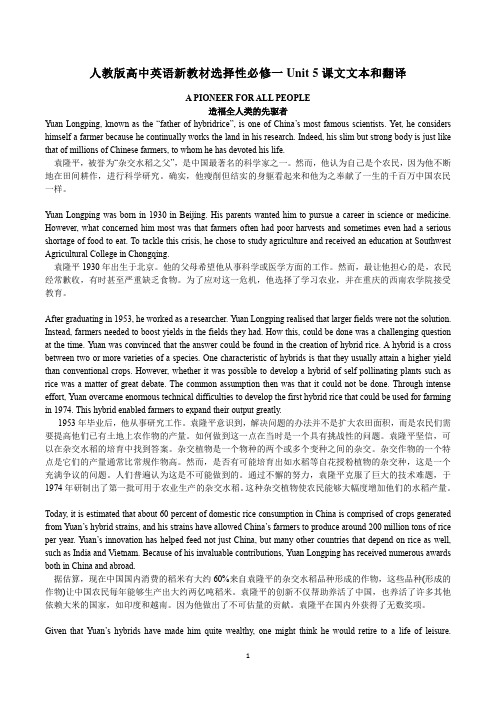
人教版高中英语新教材选择性必修一Unit 5课文文本和翻译A PIONEER FOR ALL PEOPLE造福全人类的先驱者Yuan Longping, known as the “father of hybridrice”, is one of China’s most famous scientists. Yet, he considers himself a farmer because he continually works the land in his research. Indeed, his slim but strong body is just like that of millions of Chinese farmers, to whom he has devoted his life.袁隆平,被誉为“杂交水稻之父”,是中国最著名的科学家之一。
然而,他认为自己是个农民,因为他不断地在田间耕作,进行科学研究。
确实,他瘦削但结实的身躯看起来和他为之奉献了一生的千百万中国农民一样。
Yuan Longping was born in 1930 in Beijing. His parents wanted him to pursue a career in science or medicine. However, what concerned him most was that farmers often had poor harvests and sometimes even had a serious shortage of food to eat. To tackle this crisis, he chose to study agriculture and received an education at Southwest Agricultural College in Chongqing.袁隆平1930年出生于北京。
新课标高中英语必修5 课文翻译与要点 unit1
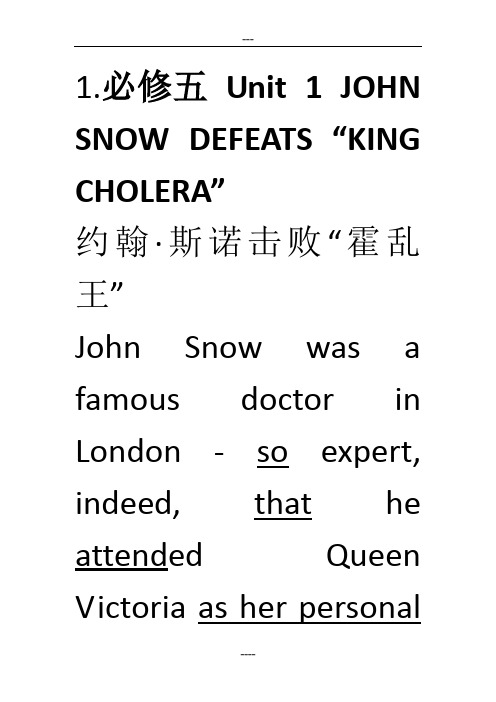
1.必修五Unit 1 JOHN SNOW DEFEATS “KING CHOLERA”约翰·斯诺击败“霍乱王”John Snow was a famous doctor in London - so expert, indeed, that he attended Queen Victoria as her personalphysician.约翰·斯诺是伦敦一位著名的医生——他的确医术精湛,因而成为照料维多利亚女王的私人医生。
But he became inspired when he thought about helping ordinary people exposed to cholera.但他一想到要帮助那些得了霍乱的普通百姓时,他就感到很振奋。
This was the deadly disease of its day.霍乱在当时是最致命的疾病,Neither its cause nor its cure was understood.人们既不知道它的病源,也不了解它的治疗方法。
So many thousands of terrified people diedevery time there was an outbreak.每次霍乱暴发时,就有大批惊恐的老百姓死去。
John Snow wanted to face the challenge and solve this problem.约翰·斯诺想面对这个挑战,解决这个问题。
He knew that cholera would never be controlled until itscause was found.他知道,在找到病源之前,霍乱疫情是无法控制的。
He became interested in two theories that possibly explained how cholera killed people.斯诺对霍乱致人死地的两种推测都很感兴趣。
人教版高中英语课文译文(必修1-必修5)
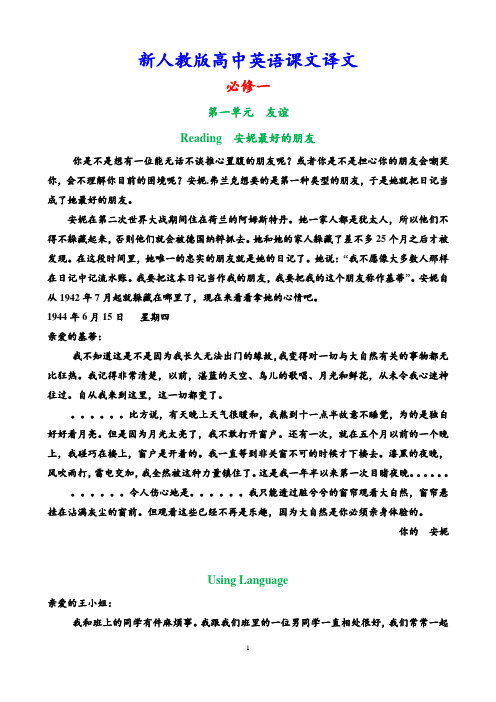
新人教版高中英语课文译文必修一第一单元友谊Reading 安妮最好的朋友你是不是想有一位能无话不谈推心置腹的朋友呢?或者你是不是担心你的朋友会嘲笑你,会不理解你目前的困境呢?安妮.弗兰克想要的是第一种类型的朋友,于是她就把日记当成了她最好的朋友。
安妮在第二次世界大战期间住在荷兰的阿姆斯特丹。
她一家人都是犹太人,所以他们不得不躲藏起来,否则他们就会被德国纳粹抓去。
她和她的家人躲藏了差不多25个月之后才被发现。
在这段时间里,她唯一的忠实的朋友就是她的日记了。
她说:“我不愿像大多数人那样在日记中记流水账。
我要把这本日记当作我的朋友,我要把我的这个朋友称作基蒂”。
安妮自从1942年7月起就躲藏在哪里了,现在来看看拿她的心情吧。
1944年6月15日星期四亲爱的基蒂:我不知道这是不是因为我长久无法出门的缘故,我变得对一切与大自然有关的事物都无比狂热。
我记得非常清楚,以前,湛蓝的天空、鸟儿的歌唱、月光和鲜花,从未令我心迷神往过。
自从我来到这里,这一切都变了。
比方说,有天晚上天气很暖和,我熬到十一点半故意不睡觉,为的是独自好好看月亮。
但是因为月光太亮了,我不敢打开窗户。
还有一次,就在五个月以前的一个晚上,我碰巧在楼上,窗户是开着的。
我一直等到非关窗不可的时候才下楼去。
漆黑的夜晚,风吹雨打,雷电交加,我全然被这种力量镇住了。
这是我一年半以来第一次目睹夜晚。
令人伤心地是。
我只能透过脏兮兮的窗帘观看大自然,窗帘悬挂在沾满灰尘的窗前。
但观看这些已经不再是乐趣,因为大自然是你必须亲身体验的。
你的安妮Using Language亲爱的王小姐:我和班上的同学有件麻烦事。
我跟我们班里的一位男同学一直相处很好,我们常常一起做家庭作业,而且很乐意相互帮助。
我们成了非常好的朋友。
可是,其他同学却开始在背后议论起来,他们说我和这位男同学在谈恋爱,这使我很生气。
我不想中断这段友谊,但是我又讨厌人家背后说闲话。
我该怎么办呢?你的丽萨亲爱的王小姐:我是湖州高中的一名学生。
新人教版高中英语必修一unit5-Elias’-Story课文翻译教学文案
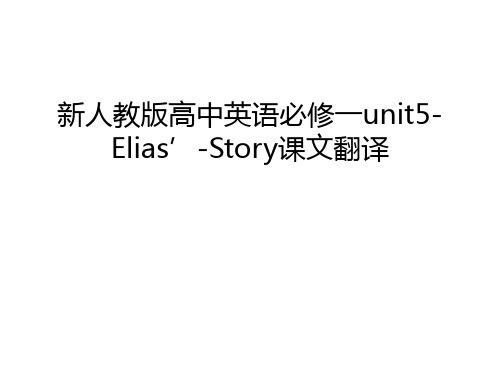
The parts of town in which they had to live were decided by white people.
他们所能住的城区都是由白人决定的。
The places outside the towns where they were sent to live were the poorest parts of South Africa.
我们选择向法律进攻。首先我们用和平的方式来破坏法律, 而当这种方式也得不到允许时,
only then did we decide to answer violence with violence.”
只有到这个时候,我们才决定用暴力反抗暴力。”
As a matter of fact, I do not like violence…
事实上,就像拉尔逊·曼德拉所说的:
“我们被置于这样一个境地:要么我们被迫接受低人一等的现实, 要么跟政府作斗争。
We chose to attack the laws. We first broke the law in a way which was peaceful; when this was not allowed
他告诉我要想在约翰内斯堡立住脚,应当如何获取所需证件。
I became more hopeful about my future.
我对自己的未来又充满了希望。
I never forgot how kind Mandela was.
我永远也忘记不了他对我的恩情,
When he organized the ANC Youth League, I joined it as soon as I could. 当他组织了非国大青年联盟时,我马上就参加了这个组织。他们被Βιβλιοθήκη 发去住的城外地区是南非最贫穷的地区。
高中英语必修五(人教版)-听力原文(含WORKBOOK部分)
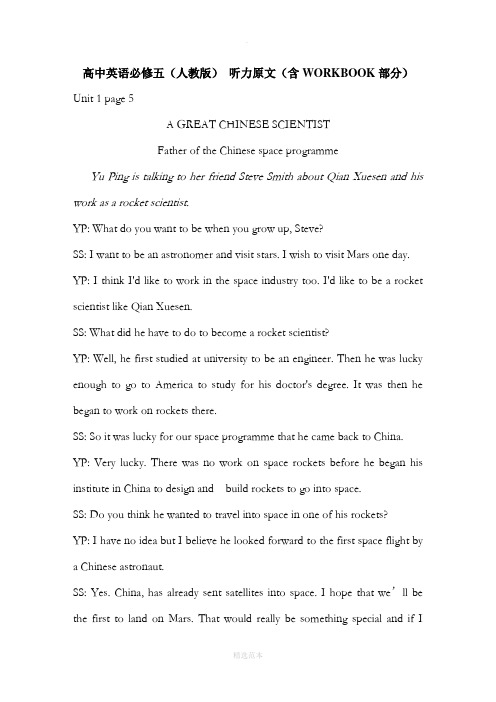
高中英语必修五(人教版)听力原文(含WORKBOOK部分)Unit 1 page 5A GREAT CHINESE SCIENTISTFather of the Chinese space programmeYu Ping is talking to her friend Steve Smith about Qian Xuesen and his work as a rocket scientist.YP: What do you want to be when you grow up, Steve?SS: I want to be an astronomer and visit stars. I wish to visit Mars one day. YP: I think I'd like to work in the space industry too. I'd like to be a rocket scientist like Qian Xuesen.SS: What did he have to do to become a rocket scientist?YP: Well, he first studied at university to be an engineer. Then he was lucky enough to go to America to study for his doctor's degree. It was then he began to work on rockets there.SS: So it was lucky for our space programme that he came back to China. YP: Very lucky. There was no work on space rockets before he began his institute in China to design and build rockets to go into space.SS: Do you think he wanted to travel into space in one of his rockets?YP: I have no idea but I believe he looked forward to the first space flight by a Chinese astronaut.SS: Yes. China, has already sent satellites into space. I hope that we’ll be the first to land on Mars. That would really be something special and if Iwere that astronaut I would put Qian Xuesen's picture on Mars to show how much we admire his work.YP: Indeed. He is called the father of the Chinese space programme. He is my hero and he is why I want to be a rocket scientist.SS: Well, we'd better get on with our homework. We need good grades to get into university.YP: Right you are. See you, then.SS: See you.Workbook unit1 Page 41NAMING A FLOWERRobert Briggs is talking to Zhang Wei about a new flower he has found. ZW: Hello Robert. What’s that book you’re carrying?RB: A book that helps you identify a flower.ZW: I see. Why do you want that?RB: Well, I’ve found this lily. It looks different to me. So I want to find out if it’snew or not. Our biology teacher told me that if it’s already known, I’d find it inthis book.ZW: Wow! So you think you may have found a new lily?RB: I hope so, but I have to do some research first to find out for sure.ZW: What happens if it’s in the book?RB: It means that somebody else has found it and named it. Then I’ll know its biological name.ZW: What do you mean by the biological name?RB: Actually like us a flower has two names. The first is the group of flowers it belongs to-like a family name. A rose is one such group. The second is the kind offlower-like a given name. It may describe what the rose looks like; for example, thecolor of an autumn sunset. Together you get the flower’s name, which is RoseAutumn Sunset.ZW: Gosh! Who made that system?RB: A great scientist called Carl Linnaeus. He lived in Sweden from 1707 to 1778.ZW: So long ago.RB: Yes, and he solved a very serious problem for biology.ZW: What was that?RB: Before him nobody could tell if a plant was new, as there was no way of checking. There’re so many plants, you see!ZW: Yes, I appreciate that! So his system is still used?RB: Ind eed it is. If my flower isn’t in this book, I’ll know that I’vefound a newkind of lily.ZW: That’s great! Can I come and help you? This research sounds fun. RB: Yes, and if I’m lucky…(fading out)Unit 2 page15CAN A ROYAL PALACE ALSO BE A PRISON?Zhang Pingyu (ZP) is trying to find out more about the history of the Tower of London from a guide (G).Part 1G:The Tower was the home of the King but also a prison. Many important people were kept there.ZP:I beg your pardon? Can you speak more slowly, please?G:Of course. Have you heard of “The Princes in the Tower”?ZP:No, I’m afraid not.G:These two princes were brothers, called Edward and Richard and they lived six hundred years ago. They came to London, for the older boy to become Edward Ⅴ, after his father, King Edward Ⅳ, died.ZP:I see. How old was he?G:He was only thirteen years old. His cruel uncle, also called Richard, was supposed to look after them both, but instead he had them killed while they were asleep.ZP:What do you mean? He killed them himself?G:No. He sent his men to kill them because he wanted to become King Richard Ⅲ. There is a story that on a dark night you can sometimes hear those princes crying.ZP:You can hear them crying? Really? I thought you said they were killed many years ago.G:Yes, but it’s only a story!Part 2ZP:Who else came to the Tower as a prisoner?G:A future queen. In the 1550s Queen Mary sent her sister, Princess Elizabeth, to the Tower as a prisoner.ZP:Strange! Why did she do that?G:She thought Elizabeth was a traitor. So she sent Elizabeth through a special gate called “Traitors’ Gate”. That only happen-ed to very bad people.ZP:I’m sorry I don’t understand. How did Elizabeth become Queen if she was a prisoner?G:Easy. Her brother and sister both died without children so Elizabeth became Queen Elizabeth Ⅰ. She tried not to be unfair to others when she was queen.ZP:I’m glad to hear that.Workbook unit 2 page 52WAS KING JAMES FAIR?A Catholic supporter is interviewing King James to find out why he changed his mind about letting the Catholics practise their religion as they wished. Part 1CS: Good morning sir. Thank you for coming to talk to me about the attack that was planned for November 6th. It was so lucky you escaped.KJ: Yes. I was very upset of course. I couldn’t believe that anyone would want to kill me. What did I ever do to Guy Fawkes and his friends?CS: But, sir, you are the person who caused this problem by changing your mind. First of all you let the Catholics practice their religion safely. Then you said it was no longer allowed. You must have known they would get upset. KJ: Please try to understand my difficulty. I thought there were only a few Catholics in the country.CS: Why did you think so?KJ: Well, because only a few people were put in prison every year for not going to the Protestant church.CS: I see. So you thought those people were the only Catholics?KJ: Yes.Part 2KJ: When I relaxed the law there seemed to be so many Catholics that I felt I’d done the wrong thing. I got frightened. I worried they might wantEngland to be a Catholic country.CS: Does that matter?KJ: Oh yes. All our friends are Protestant countries and all our enemies were Catholic ones.CS: Mm! Did you ask Fawkes and Catesby if that was what they wanted? KJ: No.CS: So the attack was planned. Actually you brought about what you wanted to avoid. What did you learn from it?KJ: I should have talked to the Catholics. If I’d done that there wouldn’t have been an attack because they would have been able to explain their point of view peacefully.CS: Thank you, sir. Goodbye.KJ: Goodbye.Unit 3 page23CAN PEOPLE REALLY LIVE ON MARSLI Qiang(LQ) is interviewing Walker Hiller(WH) on the space station about his idea for building a new town called “Wonderworld” on Mars.LQ: Well, Mr Hiller Why did you think of building a new town on Mars? WH: It sounds astonishing, doesn’t it? I imagine that it’ll be difficult and the atmosphere, gravity, and climate will have to be just like the earth ornobody will travel there.LQ: Can you i magine how that’ll be achieved?WH: Yes, I think so. The atmosphere’s too hot and has no oxygen. So people couldn’t breathe Mars’ air and live. We’ll make a covered area for people to live in with a special air supply.LQ: Is it likely you can find and use water to keep the climate similar to that on the earth?WH: Perhaps. We hope there’s water under the planet’s surface. People will have to collect all the used water so it can be cleaned and recycled as rain. Then it can be used again to water plants and crops and provide clean drinking water.LQ: Yes. I suppose everyone will have to put their dirty water in special tanks. Even animals will have to be trained to go to the toilet in special places. WH: Yes, I suppose so.LQ: So is it likely that bacteria will clean the water?WH: Well, that’s a possibility.LQ: I wonder if the houses can be made strong enough against the gravity on Mars?WH: Yes, they can. The robots will provide special building material.LQ: Still life sounds quite uncomfortable. So what’s the advantage of going to live on Mars?WH: There will be opportunities for scien-tific work and to look for gold or other metals. So people may become rich or famous.LQ: How healthy will the people be, I wonder?Workbook unit3 page 55THE DANGERS OF UNDERSEA LIVINGLi Qiang (LQ) is interviewing the designer of Saturation City, William Lee (WL), about how he saved Saturation City from disaster.Part 1LQ: What happened?WL: Well, about three months ago I was doing my monthly check on the gates when I noticed something strange.LQ: What did you notice?WL: It was too quiet. When I stepped off the shuttle-submarine the air machines should have been making a loud noise but they weren’t.LQ: So was that your first feeling that something was wrong?WL: Yes. Th en I found that the solid steel gates to the city wouldn’t open. At first I wasn’t too worried as there is a backup system in case things go wrong. When that didn’t work either, I realized we had two serious problems.Part 2LQ: Did you tell the families in Saturation City?WL: No. I examined the air machine to see if I could repair it and almostimmediately I found the cause of the problem.LQ: What was it?WL: A screen broke during anundersea storm and stopped themachine. Luckily I had anotherscreen in my toolbox. Oncefixed, the air machine was asgood as new.LQ: Did it solve the problem?WL: Yes, it did. As soon as I repaired the air machine, the gates began to open. Then I went inside to check on the families. They were fine. They hadn’t noticed anything wrong.LQ: And now you’ve been made a hero?WL: Yes. But I don’t feel like one. It’s my job to make them feel safer. LQ: What a modest answer! I think they appreciated your devotion to duty. Thank you and goodbye, Mr Lee, medal holder of the Red Star, First Class!Unit 4 page31CAN I HELP YOU?Zhou Yang (ZY) is hoping to interview Liu Ming, a famous tennis player, about his decision to work abroad. So he calls Liu Ming’s assistant, LilyWong (LM), to make an appointment.Part 1(Telephone ringing)LW: Hello. This is Lily Wong, Liu Ming’s assistant. Can I help you?ZY: Hello. I’d like to speak to Liu Ming please.LM: I’m sorry but he’s busy now. Who’s speaking?ZY: This is Zhou Yang from China Daily. I’d like to interview Liu Ming about his decision to play professional tennis abroad.LW: It’ll be difficult. You know that he’s leaving Beijing at the end of this week.ZY: Well, I’m free tomorrow afternoon and all of Wednesday.LW: OK. Now, let me see...Liu Ming’s going to see his family tomorrow and then talk to some students on Wednesday morning. Then at four o’clock he’ll go to a special party given by the leaders of our city. What about meeting his in the early afternoon?ZY: How about over lunch? Our readers will be very interested in his views. LW: Hmm... I know that he’s very happy about going abroad and hopes to return to China in a few years. Then he wants to improve Chinese tennis. Part 2ZY: Many of his fans will be sorry not to see him play in person. Watching him on TV is not quite the same.LW: Yes, I understand, but he needs to develop his skills. On TV you canstill enjoy his play.ZY: What if he never comes home? We’ll have lost a great sportsman. LW: I don’t think that he’ll stay abroad. He sa ys that he has no intention of doing that.ZY: I’m glad to hear that. But what if he gets a wonderful offer to stay? LW: I think you’ll have to discuss that with him yourself.ZY: So will 12 o’clock be OK? Where would be the best place to meet? LW: Why not meet at the Garden Hotel at 12 o’clock. I’ll put it in his diary for Wednesday so he’s sure to come.ZY: Thank you so much. Goodbye.LW: Goodbye.Workbook unit4 page 62THE IMPORTANCE OF EYEWITNESSESZhou Yang (ZY) and his photographer Fred Smith (FS) are talking about a story that they are going to cover.Part 1FS: Have you heard? We’re going to Moscow to cover the international football match tomorrow. I’m getting my camera ready. Isn’tit exciting?ZY: Yes, and it’s the Chinese national team against the Russians.FS: I think that China will win, don’t you? The team did well against Mexico last month.ZY: Did you go to that match?FS: No, but I went to the one when Britain played Turkey in Beijing.That was a good match, but something unpleasant happened.ZY: What happened?FS: Well, our British fans were not happy that their team lost.They became more upset when the Turkish fans began calling them rude names. I wondered what would happen and started taking photos.ZY: What did happen?FS: The Turkish fans started throwing bottles I kept taking my photos as evidence.Part 2ZY: Did the police come?FS: Yes, but by the time they came it was serious. They were fighting each other. It was terrible.ZY: How did it end?FS: Well, police took them to the police station. They accused the British fans of starting the fight because they had lost the match. And the British fans have a bad reputation for fighting. But I was able to put them right. Not only was I an eyewitness but I had my photographs as evidence too.ZY: Gosh! So it was lucky you were there.FS: Yes, and that I had my camera with me. Without it I wouldn’t have been able to show the police they were wrong. So you see why it’s soimportant to be on the spot when something happens.ZY: Yes. You’re able to get the right end of the stick. Did you givea statement to the police?FS: Yes, I did. I helped set many British fans free.Unit5 page 39A FIRST AID QUIZThe first aid teacher(T) is testing her students knowledge of first aid. Listen to her question and her students’ answers.T=teacher S=Sarah P=PeterR=Rachel J=Jim G=GaryPart 1T: We’ve looked at several first aid treatments. Now let’t see just what you can remember. OK. Let’s say Lucy has a nosebleed. What should she do...Sarah?S: Sit down and bend forward slightly. Squeeze her nose just below the bridge until the bleeding stops.T: Why should she lean forward?P: So she gets the blood all over the floor instead of on her clothes. (everyone laughs)T: Very funny, Peter. Rachel?R: So the blood runs out of her nose and not down her throat. If youswallow blood you might be sick.(everyone groans)T: That’s right.Part 2T:OK, next situation. What should you do if someone’s clothes are on fire? Jim?J: Stop him from running around, as that makes clothes burn faster. Tell him to drop to the floor and cover him up tightly with some thick cloth.T: And then what?J: Roll on the ground until the fire goes out. Then treat him for burns.T: Good.Part 3T: OK, what about this one? What if your friend got a piece of food caught in his throat and he’s choking? Gary?G: Nothing. But if he can’t cough, I’d bend him forwards and give him four quick hard slaps between his shoulder blades with my hand.T: Yes, that should do the trick.Part 4T: Now Peter, what if Ben badly sprained his ankle playing football?P: I’d get him to sit down and put some ice on his ankle to reduce the swelling. Then I’d tell him to put his foot up on a chair. Then I’d bandage up his ankle tightly.T: Great. Now let’s tal k about snake bites. What if a snake bites you?P: Bite it back!(everyone laughs)T: Thank you, Peter.(said with amused tolerance) Now the first thing remember is...(fading out)Workbook unit5 page 69RESCUE BREATHINGA first aid teacher is reviving a lesson on rescue breathing.T = teacher L = LucyP = Peter E = EileenPart 1T: Now class, what must we do before rescue breathing?L: We must check if the person is unconscious.T: How do we do that?L: We shake them. If there’s no mo vement we know he or she is unconscious.T: Yes, that’s right, Lucy. Anything else?P: We can also ask simple questions like “What’s your name?” or “Open your eyes please!”T: Exactly right, Peter. If the person doesn’t move or answer then they’re unconscious. Now how do we put the person in a recovery position?E: I know this. First, you put one arm straight out on the ground and bend the other arm across the chest. Second, you roll the person over onto their side. Third, bend the near leg up.T: Excellent, Eileen. What do you do to the head.E: You tilt the head backwards and turnthe face downwards a bit.T: Why?E: To let any liquid run out of the mouth and allow the tongue to fall forward.T: Good, Eileen.T: Now what’s next, Peter?P: We must clear the airway from the mouth to the lungs. We can use our fingers inside the mouth.T: Why?P: So we can check for breathing by seeing if the chest is rising and falling. Part 2T: And …P: And we put our cheek close to the face to feel if there’s any air co ming from the nose or mouth.T: Well done, Peter. But what if the person isn’t breathing?L: You must start rescue breathing.T: That’s right, Lucy. What should we do?L: Roll the person onto their back. Tilt the head back. Squeeze the nose to stop air coming out. Place your mouth over the person’s mouth. Blow into the mouth for up to two seconds. Watch the chest rise and fall. Take another breath and blow into her mouth again.T: How long should you do this?L: About 15 breaths a minute. After about a minute check the pulse and breathing again. Continue this process until the person breathes or medical help arrives.T: What should you do if breathing begins?L: Put the person in the recovery position. If there’s no breathing then continue breathing for them.T: Well done, all of you. You remember very well.。
高中英语必修五课文及翻译

高中英语必修五课文及翻译集团档案编码:[YTTR-YTPT28-YTNTL98-UYTYNN08]-必修 5Unit 2 The United KingdomReadingPUZZLES IN GEOGRAPHYPeople may wonder why different words are used to describe these four countries: England, Wales, Scotland and Northern Ireland. You can clarify this question if you study British history.First there was England. Wales was linked to it in the thirteenth century. Now when people refer to England you find Wales included as well. Next England and Wales were joined to Scotland in the seventeenth century and the name was changed to "Great Britain". Happily this was accomplished without conflict when King James of Scotland became King of England and Wales as well. Finally the English government tried in the early twentieth century to form the United Kingdom by getting Ireland connected in the same peaceful way. However, the southern part of Ireland was unwilling and broke away to form its own government. So only Northern Ireland joined with England, Wales and Scotland to become the United Kingdom and this was shown to the world in a new flag called the Union Jack.To their credit the four countries do work together in some areas (eg, the currency and international relations), but they still have very different institutions. For example, Northern Ireland, England and Scotland have different educational and legal systems as well as different football teams for competitions like the World Cup!England is the largest of the four countries, and for convenience it isdivided roughly into three zones. The zone nearest France is called the South of England, the middle zone is called the Midlands and the one nearest to Scotlandis known as the North. You find most of the population settled in the south, but most of the industrial cities in the Midlands and the North of England. Although, nationwide, these cities are not as large as those in China, they have world-famous football teams and some of them even have two! It is a pity that the industrial cities built in the nineteenth century do not attract visitors. For historical architecture you have to go to older but smaller towns built by the Romans. There you will find out more about British history and culture.The greatest historical treasure of all is London with its museums, art collections, theatres, parks and buildings. It is the centre of nationalgovernment and its administration. It has the oldest port built by the Romans in the first century AD, the oldest building begun by the Anglo-Saxons in the 1060s and the oldest castle constructed by later Norman rulers in 1066. There has been four sets of invaders of England. The first invaders, the Romans, left their towns and roads. The second, the Anglo-Saxons, left their language and their government. The third, the Vikings, influenced the vocabulary and place-names of the North of England, and the fourth, the Normans, left castles and introduced new words for food.If you look around the British countryside you will find evidence of all these invaders. You must keep your eyes open if you are going to make your trip to the United Kingdom enjoyable and worthwhile.人们可能会奇怪为什么用不同的词语来描述英格兰、威尔士、苏格兰和北爱尔兰这四个国家。
高中英语(人教版必修5)教师用书:Unit 5 Section_Ⅰ Warming Up - Reading — Pre-reading (含答案)
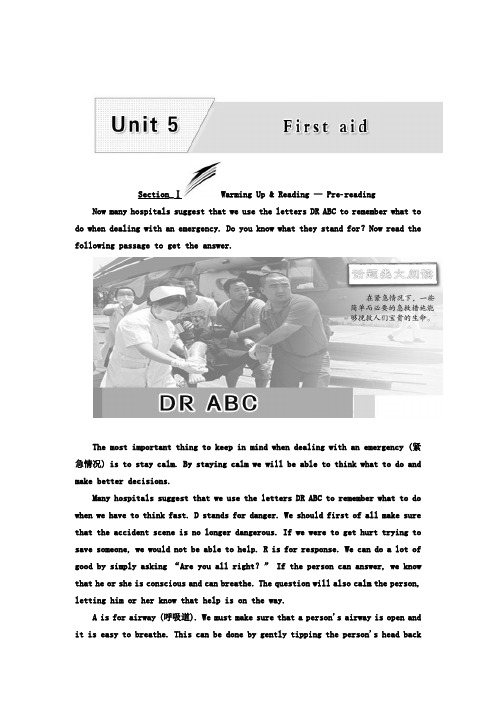
Section_ⅠWarming Up & Reading —Prereading Now many hospitals suggest that we use the letters DR ABC to remember what to do when dealing with an emergency. Do you know what they stand for?Now read the following passage to get the answer.The most important thing to keep in mind when dealing with an emergency (紧急情况) is to stay calm. By staying calm we will be able to think what to do and make better decisions.Many hospitals suggest that we use the letters DR ABC to remember what to do when we have to think fast. D stands for danger. We should first of all make sure that the accident scene is no longer dangerous. If we were to get hurt trying to save someone, we would not be able to help. R is for response. We can do a lot of good by simply asking “A re you all right?” If the person can answer, we know that he or she is conscious and can breathe. The question will also calm the person, letting him or her know that help is on the way.A is for airway (呼吸道). We must make sure that a person's airway is open and it is easy to breathe. This can be done by gently tipping the person's head backslightly. B is for breathing. We should check that the person can breathe. Is his or her chest moving?If the person is not breathing, we must try to start his or her br eathing at once, using the mouthtomouth method. If this is not done within five minutes, the person will die. If a person is breathing but not conscious, it is usually best for him or her not to be moved. C is for circulation (循环;环流).Is the person's blood circulating?We can look for colour, coughing, and eye movement. We can also check a person's pulse (脉搏) by putting a finger on the person's neck or wrist.This is what we call DR ABC, which can remind us of what to focus on when there is an emergency.Warming Up1.Look at the pictures and tell what happened.(1)The girl in Picture A cut_her_finger.(2)The girl in Picture B burnt_her_hand.(3)The man in Picture C got_an__electric_shock.(4)The woman in Picture D was_drowning.2.Nowadays there are a lot of unexpected accidents.What would you do in such situations?(1)What kind of first aid should you give to a snake bite?①The_person_bitten_must_get_a_doctor_or_go_to_hospital_at_once.②Speed_is_very_important.③It_will_help_the_doctor_greatly_if_you_can_tell_him_what_kind_of_snake_it_was,_or_describe_the_situation.(2)What kind of first aid should you give to bleeding?①Try_to_stop_the_bleeding.②Press_a_handkerchief_onto_the_bleeding_point_and_hold_it_there.③Hold_up_the_part_of_body_which_is_bleeding_if_possible.(3)What kind of first aid should you give to a sprainedankle?①Tied_with_medical_bandage.②It_is_better_to_avoid_walking_with_the_injured_ankle.③It_is_correct_to_use_ice_bag_for_removing_pain_and_bleeding,_and_also_not_influence_our_own_body_healing.(4)What kind of first aid should you give to a choke?To_treat_a_choke,_you_should_make_him/her_spit_by_patting_him/her_on_the_back.(5)What kind of first aid should you giveto a broken arm?①Do_not_move_the_patient.②Support_the_broken_arm_in_the_most_comfortable_position.③Get_medical_help_immediately.Fast Reading1.Read the text quickly and complete the main idea of it.The text mainly introduces (1)three types of burns and their characteristics as well as how to give (2)first_aid_treatment when burns happen.2.Scan the text and then choose the best answer according to the text.(1)In the text, burns are sorted according to the ________ of the skin burned.A.layer B.functionC.type D.area(2)Which of the following is NOT the function of the skin according to the text?A.It protects you against disease, poisons and the sun's harmful rays.B.It helps the heart beat.C.It can keep you warm or cool.D.It prevents your body from losing water and gives the sense of touch.(3)When cooling burns, cool water is used to do the following EXCEPT ________.A.stop the burning processB.prevent the pain becoming unbearableC.reduce swellingD.prevent any blisters being broken(4)Which of the following first aid treatment is RIGHT according to the text?A.Take clothing off the burned area even though it is stuck to the burn.B.Do not put cold water on second degree burns.C.If burns are on the face, the victim should sit up.D.If the injuries are second degree burns, it is unnecessary to get the victim to the doctor or hospital at once.(5)If someone gets burned and his hands get black and white and charred, it belongs to________.A.the first degree B.the second degreeC.the third degree D.none of the above答案:(1)~(5) ABDCCCareful Reading1.Read the text carefully and then fill in the blanks.BurnsCauses hot liquids, steam, fire, radiation, the sun, electricity orchemicals(1)Types First degree burns Second degree burns Third degree burnsCharacteristics◆dry, red andmildly(2)swollen◆mildly painful◆turn (3)whitewhen pressed◆rough, red andswollen◆blisters◆(4)watery surface◆extremely painful◆black and whiteand charred◆swollen; often(5)tissue underthem can be seen◆little or nopain if (6)nervesare damaged; maybe pain aroundedge of injuredareaFirst aid treatment◆Take off clothing and (7)jewellery near the burn.◆Place(8)cool,_clean, wetcloths on them untilthe pain decreases.◆Place cool clothson the burned arearepeatedly for(9)an_hour or so.◆Send the victim to the doctor orhospital at once.◆(10)Dry the burned area gently.◆Cover the burned area with a dry, clean (11)bandage.◆Keep burned arms or legs (12)higher than the heart.2.The text can be divided into five parts.Then find out the main idea of each part.Part 1:The_importance_of_skinPart 2:Causes_of_burnsPart 3:Types_of_burnsPart 4:Characteristics_of_burnsPart 5:First_aid_treatmentSummaryFill in the blanks according to the text.The skin, which acts as a barrier 1.against disease, poisons and the sun's harmful rays, is an essential part of your body. So if your skin gets burned it can be very serious.Depending on 2.which_ layers of the skin are burned, they are called first, second, third degree burns.First degree burns make an effect 3.on only the top layer of the skin and it turns white when 4.pressed (press).Second degree burns include severe sunburn and burns 5.caused (cause) by hot liquids.Third degree burns cause little or no pain if nerves are damaged; may be pain around edge of injured area.If possible, we should do some first aid.First, remove clothing using scissors if necessary 6.unless it is stuck to the burn.Take off other clothing near the burn.Cool burns immediately with cool 7.but not icy water which prevents the pain becoming 8.unbearable (bear) and reduces swelling.It is helpful to squeeze cool cloths 9.out_from a basin and place them on the burned area over and over again.Holdthe bandage 10.in place with tape if stly, it is vital that we should get the victim to the doctor or hospital at once if the situation becomes worse and worse.DiscussionDiscuss in groups of four to see whether the following is right or wrong.If it's wrong, explain why and give the correct statement.Sam knocked over a kettle full of boiling wateronto his legs.His legs became red, swollen and covered with blisters.Sam broke the blisters and poured icy water from the fridge onto the skin.Wrong.Sam_should_not_have_broken_the_blisters_because_the_burns_could_beco me_infected.He_should_have_poured_cool_water,_not_icy_water_on_the_burn.。
高中英语人教版必修5:Unit 1《Great scientists》
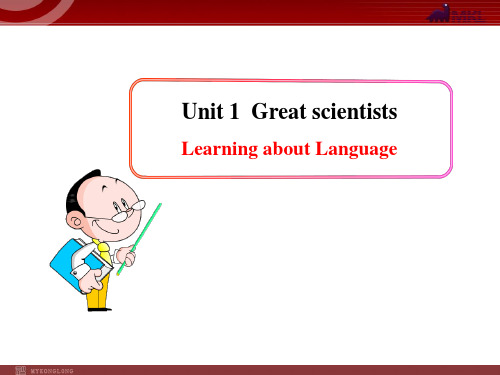
C. buying
D. being bought
3. (2012·清远高二检测)The Olympic Games, __C___in 776
B.C., did not include women players until 1912.
A. first playing
B. to be first played
华大学是成就大量杰出人物的所在地。Tsinghua University
(清华大学)和found(建立)之间是被动关系,故用过去分词作
后置定语,选C。
2. With everything she needed ___A__, the lady went home
happily.
A. bought
B. to be bought
English is difficult to learn.
6. be to blame/seek/let The house is to let. 这房子是要出租的。 The cause is not far to seek. 原因不难找到。 I felt I was to blame, too. 我觉得我也应受责备。
Struck by his sincerity,the director wanted to see him again.
4. Gentlemen always shake hands when they are introduced to each other.
Having put down my newspaper,I walked over to the window and looked out.
3. Since the director was struck by his sincerity , the director wanted to see him again.
新人教版高中英语必修5《Unit 1 Great scientists 》精品
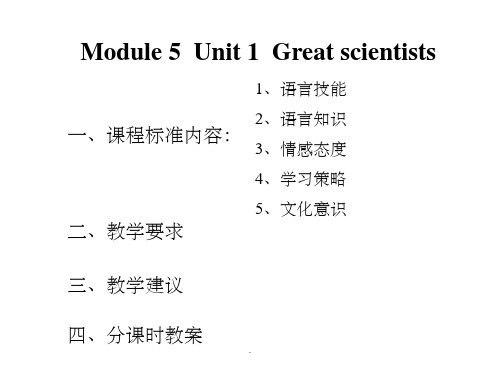
三、本单元教学建议
热身(Warming up)部分在学生课前预习的基础上,教 师可利用图片资料引入,也可以让学生讲述某位科学家的 故事或成就让其他学生来猜测,但讲述内容不宜过长。
读前(Pre-reading)部分建议呈现有关SARS和AIDS宣传 图片或视频资料,引导学生关注疾病与健康,然后再引出 cholera。可以分若干个讨论小组讨论如何进行科学研究, 让学生了解科学观点的形成过程。
.
三、本单元教学建议
语言学习(Learning about language)部分Exercise 1是用所 给词的正确形式填空。教师应确定学生了解这些词的意思 和用法。Exercise 2是一个拓展练习,要求学生掌握make+ 名词,在意义上等于这个名词的动词形式,例如:make a speech=speak。Exercise 3进一步训练动词make的用法。教 师 还 可 以 鼓 励 学 生 回 忆 更 多 的 有 关 于 make 的 用 法 。 Discovering useful structures是语法知识教学,教师可引导 学生在Reading中找到更多过去分词作定语和表语的用法。 Exercise 1、2&3帮助学生感知过去分词作定语和表语,并 逐步过渡到巩固和运用这种语言现象。
.
学习策略 :
通过周密观察、认真分析等、自助、自悟能力,以培 养学生调控策略;利用网络等媒体获取相关知 识来提高资源策略;通过交流表达观点来提高 运用交际策略的能力。
文化意识:
了解许多中外科学家的事迹及他们的贡献,扩 大知识面;以知识武装头脑,以文化陶冶情操。
.
Warming Up:
There are some great scientific achievements that have changed the world. Can you name some of them? What kind of role do they play in the field of science ? Do these achievements have anything in common? Match the inventions with their inventors below before you answer all these questions.
高中英语人教版新教材(选择性必修第一册)课文 Unit 5 Reading and Thinking课文填空和中英文翻译(含听力)
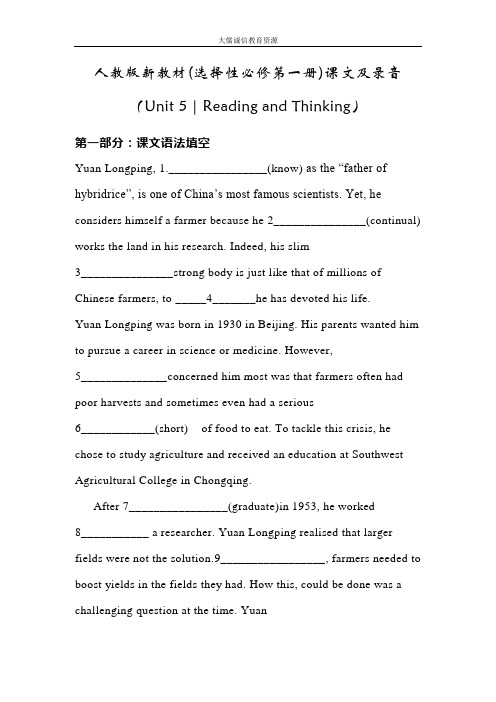
人教版新教材(选择性必修第一册)课文及录音(Unit 5 | Reading and Thinking)第一部分:课文语法填空Yuan Longping, 1.________________(know) as the “father of hybridrice”, is one of China’s most famous scientists. Yet, he considers himself a farmer because he 2_______________(continual) works the land in his research. Indeed, his slim3_______________strong body is just like that of millions of Chinese farmers, to _____4_______he has devoted his life.Yuan Longping was born in 1930 in Beijing. His parents wanted him to pursue a career in science or medicine. However,5______________concerned him most was that farmers often had poor harvests and sometimes even had a serious6____________(short) of food to eat. To tackle this crisis, he chose to study agriculture and received an education at Southwest Agricultural College in Chongqing.After 7________________(graduate)in 1953, he worked8___________ a researcher. Yuan Longping realised that larger fields were not the solution.9_________________, farmers needed to boost yields in the fields they had. How this, could be done was a challenging question at the time. Yuan10_______________(convince) that the answer could be found in the creation of hybrid rice. A hybrid is a cross between two or more varieties of a species. One characteristic of hybridsis11______________ they usually attain a higher yield than conventional crops. However, 12___________it was possible to develop a hybrid of self-pollinating plants such as rice was a matter of great debate. The common 13_______________(assume)then was that it could not be done. Through intense effort, Yuan overcame enormous technical difficulties to develop the first hybrid rice that could be used for farming in 1974. This hybrid enabled farmers to expand their output greatly.Today, it ______14__________(estimate) that about 60 percent of domestic rice consumption in China is comprised of crops generated f rom Yuan’s hybrid strains, and his strains have allowed China’s farmers to produce around 200 million tons of rice per year. Yuan’s innovation has helped feed not just China, but many other countries that depend on rice as well, such as India and Vietnam. Because of his invaluable 15________________(contribute) , Yuan Longping has received numerous awards both in China and abroad.Given that Yuan’s hybrids have made him quite wealthy, one might think he would retire to a life of leisure. However, this is far from thecase. Deep down, Yuan is still very much a farmer at heart. As a man of the soil, he cares little for celebrity or money. Instead, he makes large donations to support agricultural research.16______________impresses people most about Yuan Longpingis his ongoing ability to fulfill his dreams. Long ago, he envisioned rice plants as tall as sorghum, with each ear of rice as big as a broom, and each grain of rice as huge as a peanut. He succeeded in producing a kind of rice that could feed more people at home and abroad. His latest vision for “seawater rice” has also become a reality, and potentially opened up nearly one million square kilometres of salty land in China for rice production. 17_________________his advanced years, Yuan Longping is still young at heart and full of vision, and everyone is waiting to see what he will dream up next. 1.________________2__________________3_________________4__________________5______________6___________7_____________8___________9______________10-____________11_______________12________________________13______________ 14_____________15___________16______________17_________答案1.known2.continually3.but4.whom5.what6.shortage7.graduating8.as9.Instead10.was convinced11.that12.whether13.assumption14.is estimated15.contributions16.What17.Despite第二部分:A PIONEER FOR ALL PEOPLE造福全人类的先驱者Yuan Longping, known as the “father of hybridrice”, is one of China’s most famous scientists. Yet, he considers himself a farmer because he continually works the land in his research. Indeed, hisslim but strong body is just like that of millions of Chinese farmers, to whom he has devoted his life.袁隆平,被誉为“杂交水稻之父”,是中国最著名的科学家之一。
英语必修5课文翻译 (5)

英语必修5课文翻译第一课:I am an English Teacher原文:I am an English teacher. I teach English in a middle school. My students are from different classes. They are in Grade Seven. I love my students and my work. I often play games with them and sing songs with them. Sometimes, I play basketball with them, too.I have three classes in the morning. They are interesting and exciting. I enjoy my classes. I usually have lunch at 12:00. After lunch, I have a short rest, and then I read books in my office. I like reading books. I think books are my best friends.In the afternoon, I have two classes. After class, I help my students with their English. I enjoy helping them. I usually leave the school at 5:00 p.m.译文:我是一名英语老师。
我在一所中学教英语。
我的学生来自不同的班级,都在七年级。
我喜欢我的学生和我的工作。
我经常和他们一起玩游戏、唱歌。
有时候,我也和他们一起打篮球。
早上我有三节课。
它们非常有趣和令人兴奋。
我喜欢我的课程。
我通常在12点吃午饭。
必修5-人教版高中英语课文原文和翻译
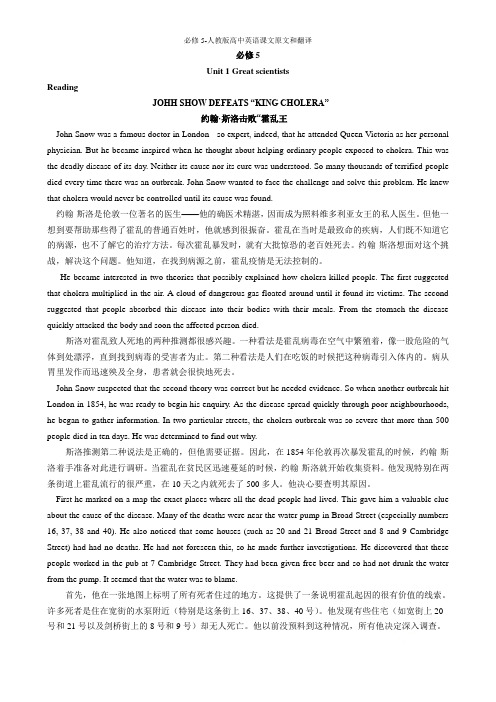
必修5Unit 1 Great scientistsReadingJOHH SHOW DEFEATS “KING CHOLERA”约翰·斯洛击败“霍乱王John Snow was a famous doctor in London - so expert, indeed, that he attended Queen Victoria as her personal physician. But he became inspired when he thought about helping ordinary people exposed to cholera. This was the deadly disease of its day. Neither its cause nor its cure was understood. So many thousands of terrified people died every time there was an outbreak. John Snow wanted to face the challenge and solve this problem. He knew that cholera would never be controlled until its cause was found.约翰·斯洛是伦敦一位著名的医生——他的确医术精湛,因而成为照料维多利亚女王的私人医生。
但他一想到要帮助那些得了霍乱的普通百姓时,他就感到很振奋。
霍乱在当时是最致命的疾病,人们既不知道它的病源,也不了解它的治疗方法。
每次霍乱暴发时,就有大批惊恐的老百姓死去。
约翰·斯洛想面对这个挑战,解决这个问题。
他知道,在找到病源之前,霍乱疫情是无法控制的。
He became interested in two theories that possibly explained how cholera killed people. The first suggested that cholera multiplied in the air. A cloud of dangerous gas floated around until it found its victims. The second suggested that people absorbed this disease into their bodies with their meals. From the stomach the disease quickly attacked the body and soon the affected person died.斯洛对霍乱致人死地的两种推测都很感兴趣。
(完整版)人教版高中英语必修5各单元课文原文

Unit 1 Great scientists“KING CHOLERA”JOHH SHOW DEFEATSJohn Snow was a famous doctor in London -so expert, indeed, that he attended Queen Victoria as her personal physician. But he became inspired when he thought about helping ordinary people exposed to cholera. This was the deadly disease of its day. Neither its cause nor its cure was understood. So many thousands of terrified people died every time there was an outbreak. John Snow wanted to face the challenge and solve this problem. He knew that cholera would never be controlled until its cause was found.He became interested in two theories that possibly explained how cholera killed people. The first suggested that cholera multiplied in the air. A cloud of dangerous gas floated around until it found its victims. The second suggested that people absorbed this disease into their bodies with their meals. From the stomachthe disease quickly attacked the body and soon the affected person died.John Snow suspected that the second theory was correct but he needed evidence. So when another outbreak hit London in 1854, he was ready to begin his enquiry. As the disease spread quickly through poor neighbourhoods, he began to gather information. In two particular streets, the cholera outbreak was so severe that more than 500 people died in ten days. He was determined to find out why.First he marked on a map the exact places where all the dead people had lived. This gave him a valuable clue about the cause of the disease. Many of the deaths were near the water pump in Broad Street (especially numbers 16, 37, 38 and 40). He also noticed that some houses (such as 20 and 21 Broad Street and 8 and 9 Cambridge Street) had had no deaths. He had not foreseen this, so he made further investigations. He discovered that these people worked in the pub at 7 Cambridge Street. They had been given free beer and so had not drunk the water from the pump. It seemed that the water was to blame.Next, John Snow looked into the source of the water for these two streets.He found that it came from the river polluted by the dirty water from London. He immediately told the astonished people in Broad Street to remove the handle from the pump so that it could not be used. Soon afterwards the disease slowed down. He had shown that cholera was spread by germs and not in a cloud of gas.In another part of London, he found supporting evidence from two other deaths that were linked to the Broad Street outbreak. A woman, who had moved away from Broad Street, liked the water from the pump so much that she had it delivered to her house every day. Both she and her daughter died of cholera after drinking the water. With this extra evidence John Snow was able to announce with certainty that polluted water carried the virus.To prevent this from happening again, John Snow suggested that the source of all the water supplies be examined. The water companies were instructed not to expose people to polluted water any more. Finally "King Cholera" was defeated.COPERNICUS’ REVOLUTIONRRY THEORYNicolaus Copernicus was frightened and his mind was confused. Although he had tried to ignore them, all his mathematical calculations led to the same conclusion: that the earth was not the centre of the solar system. Only if you put the sun theredid the movements of the other planets in the sky make sense. Yet he could not tell anyone about his theory as the powerful Christian Church would have punished him for even suggesting such an idea. They believed God had made the world and for that reason the earth was special and must be the centre of the solar system.The problem arose because astronomers had noticed that some planets in the sky seemed to stop, move backward and then go forward in a loop. Others appeared brighter at times and less bright at others. This was very strange if the earth wasthe centre of the solar system and all planets went round it.Copernicus had thought long and hard about these problems and tried to find an answer. He had collected observations of the stars and used all his mathematical knowledge to explain them. But only his new theory could do that. So between 1510and 1514 he worked on it, gradually improving his theory until he felt it was complete.In 1514 he showed it privately to his friends. The changes he made to theold theory were revolutionary. He placed a fixed sun at the centre of the solar system with the planets going round it and only the moon still going round the earth. Healso suggested that the earth was spinning as it went round the sun and this explained changes in the movement of the planets and in the brightness of the stars. His friends were enthusiastic and encouraged him to publish his ideas, but Copernicus was cautious. He did not want to be attacked by the Christian Church, so he only published it ashe lay dying in 1543.Certainly he was right to be careful. The Christian Church rejected his theory, saying it was against God's idea and people who supported it would be attacked. Yet Copernicus' theory is now the basis on which all our ideas of the universe are built.His theory replaced the Christian idea of gravity, which said things fell to earthbecause God created the earth as the centre of the universe. Copernicus showed this was obviously wrong. Now people can see that there is a direct link between his theory and the work of Isaac Newton, Albert Einstein and Stephen Hawking.Unit 2 The United KingdomPUZZLES IN GEOGRAPHYPeople may wonder why different words are used to describe these four countries: England, Wales, Scotland and Northern Ireland. You can clarify this question if you study British history.First there was England. Wales was linked to it in the thirteenth century.Now when people refer to England you find Wales included as well. Next England and Wales were joined to Scotland in the seventeenth century and the name was changed to "Great Britain". Happily this was accomplished without conflict when King Jamesof Scotland became King of England and Wales as well. Finally the English government tried in the early twentieth century to form the United Kingdom by getting Ireland connected in the same peaceful way. However, the southern part of Ireland was unwilling and broke away to form its own government. So only Northern Ireland joined with England, Wales and Scotland to become the United Kingdom and this was shown to the world in a new flag called the Union Jack.To their credit the four countries do work together in some areas (eg, the currency and international relations), but they still have very differentinstitutions. For example, Northern Ireland, England and Scotland have different educational and legal systems as well as different football teams for competitionslike the World Cup!England is the largest of the four countries, and for convenience it is divided roughly into three zones. The zone nearest France is called the South of England, the middle zone is called the Midlands and the one nearest to Scotland is known as the North. You find most of the population settled in the south, but most of the industrial cities in the Midlands and the North of England. Although, nationwide,-famous football teams these cities are not as large as those in China, they have worldand some of them even have two! It is a pity that the industrial cities built in the nineteenth century do not attract visitors. For historical architecture you have togo to older but smaller towns built by the Romans. There you will find out more about British history and culture.The greatest historical treasure of all is London with its museums, art collections, theatres, parks and buildings. It is the centre of national governmentand its administration. It has the oldest port built by the Romans in the first century AD, the oldest building begun by the Anglo-Saxons in the 1060s and the oldest castle constructed by later Norman rulers in 1066. There has been four sets of invaders of England. The first invaders, the Romans, left their towns and roads. The second, the Anglo-Saxons, left their language and their government. The third, the Vikings, influenced the vocabulary and place-names of the North of England, and the fourth,the Normans, left castles and introduced new words for food.If you look around the British countryside you will find evidence of all these invaders. You must keep your eyes open if you are going to make your trip to the United Kingdom enjoyable and worthwhile.SIGHTSEEING IN LONDONWorried about the time available, Zhang Pingyu had made a list of the sites she wanted to see in London. Her first delight was going to the Tower. It was builtlong ago by the Norman invaders of AD 1066. Fancy! This solid stone, square tower had remained standing for one thousand years.Although the buildings had expanded around it, it remained part of a royal palace and prison combined. To her great surprise, Zhang Pingyu found the Queen's jewels guarded by special royal soldiers who, on special occasions, still wore the four-hundred-year-old uniform of the time of Queen Elizabeth I.There followed St Paul's Cathedral built after the terrible fire of Londonin 1666. It looked splendid when first built! Westminster Abbey, too, was very interesting. It contained statues in memory of dead poets and writers, such as Shakespeare. Then just as she came out of the abbey, Pingyu heard the famous sound of the clock, Big Ben, ringing out the hour. She finished the day by looking at the outside of Buckingham Palace, the Queen's house in London. Oh, she had so much to tell her friends!The second day the girl visited Greenwich and saw its old ships and famous clock that sets the world time. What interested her most was the longitude line. It is an imaginary line dividing the eastern and western halves of the world and is very useful for navigation. It passes through Greenwich, so Pingyu had a photo taken standingon either side of the line.The last day she visited Karl Marx's statue in Highgate Cemetery. It seemed strange that the man who had developed communism should have lived and died in London. Not only that, but he had worked in the famous reading room of the Library of the British Museum. Sadly the library had moved from its original place into another building and the old reading room was gone. But she was thrilled by so many wonderful treasures from different cultures displayed in the museum. When she saw many visitors enjoying looking at the beautiful old Chinese pots and other objects on show, shefelt very proud of her country.The next day Pingyu was leaving London for Windsor Castle. "Perhaps I will see the Queen?" she wondered as she fell asleep.Unit 3 Life in the futureFIRST IMPRESSIONSSpacemall: liqiang299A@ 15/11/3008 (Earthtime) Dear Mum and Dad,I still cannot believe that I am taking up this prize that I won last year. I have to remind myself constantly that I am really in AD 3008. Worried about the journey, Iwas unsettled for the first few days. As a result, I suffered from “Time lag”. This isyou get from flying, but it seems you keep getting flashbacks similar to the “jet lag” from your previous time period. So I was very nervous and uncertain at first. However, my friend and guide, Wang Ping, was very understanding and gave me some green tablets which helped a lot. Well-known for their expertise, his parents' company, called "Future Tours", transported me safely into the future in a time capsule.I can still remember the moment when the space stewardess called us all to the capsule and we climbed in through a small opening. The seats were comfortable and after a calming drink, we felt sleepy and closed our eyes. The capsule began swinging gently sideways as we lay relaxed and dreaming. A few minutes later, the journey was completed and we had arrived. I was still on the earth but one thousand years in the future. What would I find?At first my new surroundings were difficult to tolerate. The air seemed thin, as though its combination of gases had little oxygen left. Hit by a lack of freshair, my head ached. Just as I tried to make the necessary adjustment to this new situation, Wang Ping appeared. "Put on this mask," he advised. "It'll make you feel much better." He handed it to me and immediately hurried me through to a small room nearby for a rest. I felt better in no time. Soon I was back on my feet again and following him to collect a hovering carriage driven by computer. These carriages float above the ground and by bending or pressing down in your seat, you can move swiftly. Wang Ping fastened my safety belt and showed me how to use it. Soon I could fly as fast as him. However, I lost sight of Wang Ping when we reached what looked like a large market because of too many carriages flying by in all directions. He was sweptup into the centre of them. Just at that moment I had a "time lag" flashback and sawthe area again as it had been in the year AD 2008. I realized that I had been transported into the future of what was still my hometown! Then I caught sight of Wang Ping again and flew after him.Arriving at a strange-looking house, he showed me into a large, bright clean room. It had a green wall, a brown floor and soft lighting. Suddenly the wall moved- it was made of trees! I found later that their leaves provided the room withmuch-needed oxygen. Then Wang Ping flashed a switch on a computer screen, and a table and some chairs rose from under the floor as if by magic. "Why not sit down and eat a little?" he said. "You may find this difficult as it is your first time travel trip.Just relax, since there is nothing planned on the timetable today. Tomorrow you'llbe ready for some visits." Having said this, he spread some food on the table, and produced a bed from the floor. After he left, I had a brief meal and a hot bath. Exhausted, I slid into bed and fell fast asleep.More news later from your loving son,Li QiangI HAVE SEEN AMAZING THINGSMy first visit was to a space station considered the most modem in space. Described as an enormous round plate, it spins slowly in space to imitate the pullof the earth's gravity. Inside was an exhibition of the most up-to-date inventionsof the 31 st century. A guide (G) showed us around along a moveable path.G: Good morning to all our visitors from 2008. First we're going to examineone of the latest forms of communication among our space citizens. No more typists working on a typewriter or computer! No more postage or postcodes! Messages c an now be sent using a "thoughtpad". You place the metal band over your head, clear your mind, press the sending button, think your message a nd the next instant it's sent. It's stored on the "thoughtpad" of the receiver. It's quick, efficient and environmentally friendly. The only limitation is if the user does not think his or her message clearly,an unclear message may be sent. But we cannot blame the tools for the faults of the user, can we?During the explanation I looked at the pair of small objects called "thoughtpads" on a table. They just looked like metal ribbons. So ordinary but so powerful! While I was observing them, the path moved us on.G: And now ladies and gentlemen, we are in the "environment area". People used to collect waste in dustbins. Then the rubbish was sent to be buried or burned, am I fight? (We nodded.) Well, now there's a system where the waste is disposed of using the principles of ecology. A giant machine, always greedy for more, swallows all the waste available. The rubbish is turned into several grades of useful material, suchas "fertilizer" for the fields and "soil" for deserts. Nothing is wasted, andeverything, even plastic bags, is recycled. A great idea, isn't' it?I stared at the moving model of the waste machine, absorbed by its efficiency. But again we moved on.G: Our third stop shows the changes that have happened to work practices. Manufacturing no longer takes place on the earth but on space stations like this one.A group of engineers programme robots to perform tasks in space. The robots produce goods such as drugs, clothes, furniture, hovering carriages, etc. There is no waste,no pollution and no environmental damage! However, the companies have to train their representatives to live and work in space settlements. They have to monitor the robots and the production. When the goods are ready they're transported by industrial spaceship back to earth.My mind began to wander. What job would I do? My motivation increased as I thought of the wonderful world of the future.Unit 4 Making the newsMY FIRST WORK ASSIGNMENT"Unforgettable", says new journalistNever will Zhou Yang (ZY) forget his first assignment at the office of a popular English newspaper. His discussion with his new boss, Hu Xin (HX), was to strongly influence his life as a journalist.HX: Welcome. We're delighted you're coming to work with us. Your first job herewill be an assistant journalist. Do you have any questions?ZY: Can I go out on a story immediately?HX: (laughing) That' s admirable, but I' m afraid it would be unusual ! Wait tillyou' re more experienced. First we'll put you as an assistant to an experienced journalist. Later you can cover a story and submit the article yourself.ZY: Wonderful. What do I need to take with me? I already have a notebook and camera.HX: No need for a camera. You'll have a professional photographer with you to take photographs. You'll find your colleagues very eager to assist you, so you may be able to concentrate on photography later if you' re interested.ZY: Thank you. Not only am I interested in photography, but I took an amateur course at university to update my skills.HX: Good.ZY: What do I need to remember when I go out to cover a story?HX: You need to be curious. Only if you ask many different questions will you acquire all the information you need to know. We say a good journalist must have a good "nose" for a story. That means you must be able to assess when people are not telling the whole troth and then try to discover it. They must use research to inform themselves of the missing parts of the story.ZY: What should I keep in mind?HX: Here comes my list of dos and don'ts: don't miss your deadline, don't be rode, don't talk too much, but make sure you listen to the interviewee carefully.ZY: Why is listening so important?HX: Well, you have to listen for detailed facts. Meanwhile you have to prepare the next question depending on what the person says.ZY: But how can I listen carefully while taking notes?HX: This is a trick of the trade, If the interviewee agrees, you can use a recorderto get the facts straight. It's also useful if a person wants to challenge you. Youhave the evidence to support your story.ZY: I see! Have you ever had a case where someone accused your journalists of getting the wrong end of the stick?HX: Yes, but it was a long time ago. This is how the story goes. A footballer was accused of taking money for deliberately not scoring goals so as to let the otherteam win. We went to interview him. He denied taking money but we were sceptical.So we arranged an interview between the footballer and the man supposed to bribe him. When we saw them together we guessed from the footballer's body language that he was not telling the truth. So we wrote an article suggesting he was guilty. It was a dilemmabecause the footballer could have demanded damages if we were wrong. He tried tostop us publishing it but later we were proved right.ZY: Wow! That was a real "scoop". I'm looking forward to my first assignmentnow. Perhaps I'll get a scoop too!HX: Perhaps you will. You never know.GETTING THE "SCOOP""Quick," said the editor. "Get that story ready. We need it in this editionto be ahead of the other newspapers. This is a scoop." Zhou Yang had just come backinto the office after an interview with a famous film star. "Did he really do that?"asked someone from the International News Department. "Yes, I' m afraid he did," ZhouYang answered. He set to work.His first task was to write his story, but he had to do it carefully. Althoughhe realized the man had been lying, Zhou Yang knew he must not accuse him directly.He would have to be accurate. Concise too! He knew how to do that. Months of traininghad taught him to write with no wasted words or phrases. He sat down at his computerand began to work.The first person who saw his article was a senior editor from his department.-editor. She beganHe checked the evidence, read the article and passed it on to the copyto edit the piece and design the main headline and smaller heading. ?°This will look very good on the page,?± she said. "Where is a good picture of this man?" Then as thearticle was going to be written in English Zhou Yang also took a copy to the nativespeaker employed by the newspaper to polish the style. She was also very happy withZhou Yang's story. "You are really able to write a good front page article," she said.Zhou Yang smiled with happiness. Last of all, the chief editor read it and approved it."Well done," he said to Zhou Yang. "But please show me your evidence so we're surewe've got our facts straight.?± ?°I?ˉll bring it to you immediately," said Zhou Yang excitedly.The news desk editor took the story and began to work on all the stories andphotos until all the pages were set. All the information was then ready to be processedinto film negatives. This was the first stage of the printing process. They needed fournegatives, as several colours were going to be used on the story. Each of the maincolours had one negative sheet and when they were combined they made a colouredpage for the newspaper. After one last check the page was ready to be printed. ZhouYang waited excitedly for the first copies to be ready. "Wait 611 tonight," his friendwhispered. "I expect there will be something about this on the television news. A realscoop!"Unit 5 First aidFIRST AID FOR BURNSThe skin is an essential part of your body and its largest organ. You have three layers of skin which act as a barrier against disease, poisons and the sun's harmful rays. The functions of your skin are also very complex: it keeps you warm or cool; it prevents your body from losing too much water; it is where you feel cold, heat or pain and it gives you your sense of touch. So as you can imagine, if your skin gets burned it can be very serious. First aid is a very important first stepin the treatment of bums.Causes of burnsYou can get burned by a variety of things: hot liquids, steam, fire, radiation (by being close to high heat or fire, etc), the sun, electricity or chemicals.Types of burnsThere are three types of burns. Burns are called first, second or third degree burns, depending on which layers of the skin are burned.First degree burns These affect only the top layer of the skin. These burnsare not serious and should feel better within a day or two. Examples includemild sunburn and burns caused by touching a hot pan, stove or iron for amordent.Second degree burns These affect both the top and the second layer of theskin.These bums are serious and take a few weeks to heal. Examples include severe sunburn and bums caused by hot liquids.Third degree burns These affect all three layers of the skin and any tissueand organs under the skin. Examples include burns caused by electric shocks,burning clothes, or severe petrol fires. These burns cause very severe injuriesand the victim must go to hospital at once.Characteristics of burnsFirst degree burnsdry, red and mildly swollenmildly painfulturn white when pressedSecond degree burnsrough, red and swollenblisterswatery surfaceextremely painfulThird degree burnsblack and white and charredswollen; often tissue under them can beseenlittle or no pain if nerves are damaged; maybe pain around edge of injured area.First aid treatment1Remove clothing using scissors if necessary unless it is stuck to the burn. Take off other clothing and jewellery near the burn.2 Cool burns immediately with cool but not icy water. It is best to place burns under gently running water for about 10 minutes. (The cool water stops the burning process, prevents the pain becoming unbearable and reduces swelling.) Do not put cold water on third degree burns.3 For first degree burns, place cool, clean, wet cloths on them until the painis not so bad. For second degree burns, keep cloths cool by putting them back ina basin of cold water, squeezing them out and placing them on the burned area over and over again for about an hour until the pain is not so bad.4 Dry the burned area gently. Do not rob, as this may break any blisters and the wound may get infected.5 Cover the burned area with a dry, clean bandage that will not stick to the skin. Hold the bandage in place with tape. Never put butter, oil or ointment on bums as they keep the heat in the wounds and may cause infection.6 If bums are on arms or legs, keep them higher than the heart, if possible. If bums are on the face, the victim should sit up.7 If the injuries are second or third degree bums, it is vital to get the victimto the doctor or hospital at once.HEROIC TEENAGER RECEIVES AWARDSeventeen-year-old teenager, John Janson, was honoured at the Lifesaver Awards last night in Rivertown for giving lifesaving first aid on his neighbour after a shocking knife attack.John was presented with his award at a ceremony which recognized the bravery of ten people who had saved the life of another.John was studying in his room when he heard screaming. When he and his father rushed outside, a man ran from the scene. They discovered that Anne Slade, mother of three, had been stabbed repeatedly with a knife. She was lying in her front garden bleeding very heavily. Her hands had almost been cut off.It was John's quick action and knowledge of first aid that saved Ms Slade's life. He immediately asked a number of nearby people for bandages, but when nobody could put their hands on any, his father got some tea towels and tape from their house. John used these to treat the most severe injuries to Ms Slade's hands. He slowed the bleeding by applying pressure to the wounds until the police and ambulance arrived."I'm proud of what I did but I was just doing what I'd been taught," John said.John had taken part in the Young Lifesaver Scheme at his high school. When congratulating John, Mr Alan Southerton, Director of the Young Lifesaver Scheme said, "There is no doubt that John's quick thinking and the first aid skills he learned at school saved Ms Slade's life. It shows that a knowledge of first aid can make a real difference."Before receiving their awards last night, John and the nine other Life Savers attended a special reception yesterday hosted by the Prime Minister.。
人教版高中英语 课文原文 第一册上下 手机电子书,方便随时学习
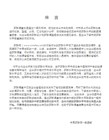
第一册 上 Unit 2 English around the world
READING
ENGLISH AROUND THE WORLD
English is a language spoken all around the world. There are more than 42 countries where the majority of the people speak English. Most native speakers of English are found in the United kingdom, the United States of America, Canada, Australia, South Africa, Ireland and New Zealand. In total, for more than 375 million people English is their mother tongue. An equal number of people learn English as a second language. These people will perhaps speak the language of their own country at home with their family, but the language of the government, schools, newspapers and TV is English. This situation is found Байду номын сангаасn countries such as India, Pakistan, Nigeria and the Philippines.
高中英语必修5_Unit2_The_United_Kingdom课文(人教新课标)
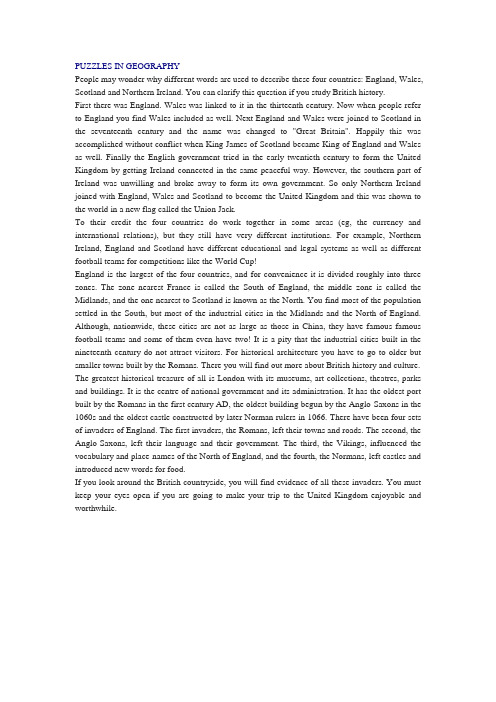
PUZZLES IN GEOGRAPHYPeople may wonder why different words are used to describe these four countries: England, Wales, Scotland and Northern Ireland. You can clarify this question if you study British history.First there was England. Wales was linked to it in the thirteenth century. Now when people refer to England you find Wales included as well. Next England and Wales were joined to Scotland in the seventeenth century and the name was changed to "Great Britain". Happily this was accomplished without conflict when King James of Scotland became King of England and Wales as well. Finally the English government tried in the early twentieth century to form the United Kingdom by getting Ireland connected in the same peaceful way. However, the southern part of Ireland was unwilling and broke away to form its own government. So only Northern Ireland joined with England, Wales and Scotland to become the United Kingdom and this was shown to the world in a new flag called the Union Jack.To their credit the four countries do work together in some areas (eg, the currency and international relations), but they still have very different institutions. For example, Northern Ireland, England and Scotland have different educational and legal systems as well as different football teams for competitions like the World Cup!England is the largest of the four countries, and for convenience it is divided roughly into three zones. The zone nearest France is called the South of England, the middle zone is called the Midlands, and the one nearest to Scotland is known as the North. You find most of the population settled in the South, but most of the industrial cities in the Midlands and the North of England. Although, nationwide, these cities are not as large as those in China, they have famous-famous football teams and some of them even have two! It is a pity that the industrial cities built in the nineteenth century do not attract visitors. For historical architecture you have to go to older but smaller towns built by the Romans. There you will find out more about British history and culture. The greatest historical treasure of all is London with its museums, art collections, theatres, parks and buildings. It is the centre of national government and its administration. It has the oldest port built by the Romans in the first century AD, the oldest building begun by the Anglo-Saxons in the 1060s and the oldest castle constructed by later Norman rulers in 1066. There have been four sets of invaders of England. The first invaders, the Romans, left their towns and roads. The second, the Anglo-Saxons, left their language and their government. The third, the Vikings, influenced the vocabulary and place-names of the North of England, and the fourth, the Normans, left castles and introduced new words for food.If you look around the British countryside, you will find evidence of all these invaders. You must keep your eyes open if you are going to make your trip to the United Kingdom enjoyable and worthwhile.。
新教材高中英语Unit5SectionⅠ课件新人教版选择性必修第一册

词汇精讲
1.【教材原文】Indeed,his slim but strong body was just like that of millions of Chinese farmers,to whom he had devoted his life.(page 50)
确实,他瘦削但结实的身躯看起来和他为之奉献了一生的千 千万万的中国农民一样。
13. comprise vt.包括;包含;由……组成 14. generate vt.产生;引起 15. leisure n.闲暇;休闲;空闲 16. soil n.泥土;土壤;国土;领土 17. celebrity n.名望;名誉;名人;名流 18. grain n.谷物;谷粒;颗粒 19. vision n.想象;视力;视野;影像
In 1973,in cooperation with others,Yuan was finally able to establish a complete process of creating and reproducing high-yielding hybrid rice species.The next year they successfully cultivated2 a type of hybrid rice species which had great advantages.It yielded 20 percent more per unit than that of common ones,putting China in the lead worldwide in rice
49 (years old).
词汇认知
重点单词 1. tackle vt.解决(难题);应付(局面);处理 2. crisis n.(pl.crises) 危机;危急关头 3. boost vt.使增长;使兴旺 n.增长;提高;激励 4. yield n. 产量;产出 vt.出产(作物);产生(收益、效益等) vi.屈服;让步 5. characteristic n.特征;特点;品质 adj.典型的;独特的
人教版高中英语必修五高二Unit5FirstAidUsingLanguage

活学活用 完成句子 约翰是在父母的压力下才答应去的。 John only agreed to go________ ________ _______ _his parents.
答案:underpressurefrom
1.cut off 1)切去,割掉,砍掉,剪掉 Don't cut your fingers off! 小心别切断手指头! 2)阻碍,阻挡,堵塞 This fence cuts off our view of the sea. 篱笆挡住了我们观望大海的视线。
Jean was really cut up when her husband left her. 在丈夫抛弃她之后,简痛苦极了。
5)cut sth. out(of sth.)剪下 That's an interesting article——I'll cut it out. 这是篇有趣的文章,我把它剪下来。 6)cut in (on sb./sth.)插嘴 Don't cut in while I'm talking. 我说话时别插嘴。
2)vi. (1)申请,请求 I come here today to apply for the job. 我今天来这儿就是要申请这份工作。 (2)使用,有效 The school rules apply to us all. 校规适用于我们所有的人。
知识拓展 1)apply for 申请(获得……) apply to sb. for sth. 向某人申请某事 apply to 适用于 apply sth. to sth. 把……应用于…… 2)applied adj. 应用的,实用的 application n. 应用,适用;申请
2)~sth.(for sth.)|~sth.(to sb.)提出,提交 The committee is presenting its investigation report next week. 委员会将于下星期提出调查报告。 3)~sth.|~sth./sb./oneself as sth.(以某方式或角度)展 现、显示、表示 The company has decided it must present a more modern image. 公司已决定,必须展现出更加现代的形象。
- 1、下载文档前请自行甄别文档内容的完整性,平台不提供额外的编辑、内容补充、找答案等附加服务。
- 2、"仅部分预览"的文档,不可在线预览部分如存在完整性等问题,可反馈申请退款(可完整预览的文档不适用该条件!)。
- 3、如文档侵犯您的权益,请联系客服反馈,我们会尽快为您处理(人工客服工作时间:9:00-18:30)。
---------------------------------------------------------------最新资料推荐------------------------------------------------------
人教版高中英语必修5课文原文
. 必修 5 Uni t 1 JOHH SHOW DEFEATS KING CHOLERA John Snow was a famous doctor in London - so expert, indeed,
that he attended Queen Victoria as her personal physician. But
he became inspired when he thought about helping ordinary
people exposed to cholera. This was the deadly disease of its
day. Neither its cause nor its cure was understood. So many
thousands of terrified people died every time there was an
outbreak. John Snow wanted to face the challenge and solve
this problem. He knew that cholera would never be controlled
until its cause was found. He became interested in
two theories that possibly explained how cholera killed people.
The first suggested that cholera multiplied in the air. A
cloud of dangerous gas floated around until it found its victims.
The second suggested that people absorbed this disease into
their bodies with their meals. From the stomach the disease
quickly attacked the body and soon the affected person died. John Snow suspected that the second theory was correct but he
needed evidence. So when another outbreak hit London in 1854,
he was ready to begin his enquiry. As the disease spread
quickly through poor neighbourhoods, he began to gather
1/ 2
information. In two . particular streets, the cholera
outbreak was so severe that more than 500 people died in ten
days. He was determined to find out why. First he
marked on a map the exact places where all the dead people had
lived. This gave him a valuable clue about the cause of the
disease. Many of the deaths were near the water pump in Broad
Street (especially numbers 16, 37, 38 and 40) . He also
noticed that some houses (such as 20 and 21 Broad Street and
8 and 9 Cambridge Street) had had no deaths. He had not
foreseen this, so he made further investigations. He discovered that these people worked in the pub at 7 Cambridge
Street. They had been given free beer and so had not drunk the
water from the pump. It seemed that the water was to blame. Next, ...。
